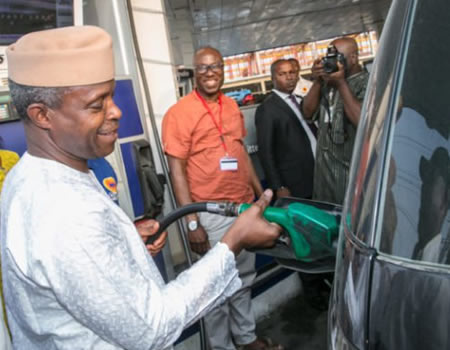Subsidy is a benefit given to an individual, business, or institution, usually by government, a group or individual. It could be in form of cash payment or tax reduction. It is typically given to remove some type of burden and often considered to be in the overall interest of the public, offered to promote a social good or an economic policy.
It is introduced by governments all over the world to hedge against foreign competition to vulnerable businesses, promote particular economic sectors or encourage citizens to patronise particular goods and services.
However, critics of subsidies point to problems with calculating optimal subsidies, overcoming unseen costs and preventing political incentives from making subsidies more burdensome than beneficial.
Subsidy is a benefit given to an individual, business, or institution, usually by the government, group or individual. It could be in form of cash payment or tax reduction. It is typically given to remove some type of burden and often considered to be in the overall interest of the public, given to promote a social good or an economic policy.
It is introduced by governments all over the world to hedge against foreign competition to vulnerable businesses, promote particular economic sectors or encourage citizens to patronise particular goods and services.
However, critics of subsidies point to problems with calculating optimal subsidies, overcoming unseen costs and preventing political incentives from making subsidies more burdensome than they are beneficial.
Proponents of subsidies in mixed economies contend that particular industries are vital to help support businesses and the jobs they create.
Again, they say subsidies are justifiable to provide the socially optimal level of goods and services which will lead to economic efficiency.
They mention the general equilibrium theory that subsidies are necessary when a market failure causes too little production in a specific area.
Opponents on the other hand argue that free market forces should determine if a business survives or fails. If it fails, those resources will be allocated to a more efficient and profitable use. In their view, subsidies unnecessarily distort markets by preventing efficient outcomes because resources are diverted from more productive uses to less productive areas.
To be sure there are various forms of subsidies in Nigeria like fuel subsidy, which targets the general population, there are also multiple subsidies targeting specific sectors including pioneer status to companies, tax relief for research and development, in-plant training, investment in infrastructure, minimum local raw materials utilisation and manufacturing.
There also subsidies granted in the field of agriculture, solid minerals, petroleum, telecommunications, energy, tourism, transport, export processing zones and so on.
An ActionAid study in 2016 showed that Nigeria lost $3.3 billion in tax waiver to three partners in a joint venture.
Also in 2014, former Coordinating Minister for the Economy and Minister of Finance, Dr Ngozi OkonoIweala revealed that Nigeria had lost N797.8 billion between 2011 and May 2014 to import waivers and tax holiday concessions.
Another report by ActionAid and Tax Justice Network Africa showed that Nigeria loses about $2.9 billion revenue yearly to corporate organisations as tax incentives. A trade war between Dangote Group and BUA Group recently occupied public attention when it was alleged that one of the companies operating from an export processing zone, which was supposed to produce only for export was channelling its products into the domestic market thus taking undue advantage over others.
Incentives in the sugar sector include five-year tax holiday for investors in the value chain; 10 per cent import duty and 50 per cent levy on imported raw sugar; and a 20 per cent duty and 60 percent levy for imported refined sugar.
All these are subsidies. However, once cash strapped, government’s focus is usually directed at fuel subsidies.
In February 2021, Nigerian National Petroleum Corporation said it granted N112 billion subsidy to about 205 million Nigerians.
Fuel subsidies were first introduced in Nigeria in the 1970s as part of measures to cushion the macroeconomic impacts of oil price shocks in 1973 following the Arab-Israeli war. The national oil company had planned to unify the price but the Head of State at the time overruled the decision. He felt that Nigerians would not be able to afford the resulting price at the pump. He then introduced subsidy to keep the price affordable.
Over the years however, activities of smugglers coupled with ineptitude and corrupt tendencies of Nigerian Customs Service personnel ensured that daily truck out far outstrips consumption. In boom times, this usually constitutes a little nuisance to public purse but once in a while when the cycle of burst comes and the country is hit by cash and foreign exchange crunch, government remembers the need to remove subsidy. These attempts have been met with ferocious resistance by majority of Nigerians usually led by organised labour and human right organisations.
Since 1999, rather than remove subsidies, Nigerians have only allowed government to increase prices periodically. In recent years, the naira value of imported premium motor spirit (PMS) has been on the increase but this is due largely to a constantly depreciating value of the naira and almost absolute dependence on importation for local consumption. NNPC has been unable to maintain functional refineries.
Over the years, the four refineries in Kaduna, Warri and Port Harcourt have become moribund and drain pipes on public finance. According to an NNPC audit report, Nigeria lost N1.65 trillion in five years to the refineries between 2014 and 2019. And despite wasting about $25 billion on turnaround maintenance of the refineries in the last two decades, Federal Executive Council yet again approved another turnaround maintenance contract of $1.5 billion for Port Harcourt Refinery in March 2021.
In essence, fuel subsidy is not the only reason the Federation Account is poorly funded. Inefficiencies and corruption associated with the management of the oil industry also play major part in addition to subsidies granted to cronies of government officials. By Nigeria’s definition of poverty as earning less than N376.40 per day, National Bureau of Statistics (NBS) estimates that 40.1 per cent of citizens live below poverty line. The Bureau also reported recently that 33.3 per cent of citizens in working age group are unemployed.
The agency also put poverty rate for Sokoto at close to 90 per cent while Jigawa and Taraba have poverty rates of over 80 per cent each. In essence, once a litre of PMS begins to sell for the Petroleum Product Pricing and Regulatory Agency (PPPRA) recommended price of N230 per litre, which was the template for March 2021, an average resident of Sokoto, Jigawa or Taraba states will no longer be able to eat at all as the cost of transportation to the farm will completely wipe off his daily income. Government’s argument is that subsidies come at a high cost, saying that opportunity costs of such spending on other development objectives is large; that distribution of resources to state governments are reducing; that the vast majority of the subsidy goes to wealthier Nigerians; and that cheaper petrol encourages greater pollution, congestion and climate change.
This argument makes little meaning to most Nigerians who oppose the reduction or removal of subsidies. Over the years, different framings of reform failed to alter public opinion on the merits of removal of subsidy. This is a pointer to deep-rooted beliefs about the role of petrol subsidies in Nigeria’s social contract. Most Nigerians outside government or the oil industry believe that the only benefit they derive from their government is the oil subsidy. Majority of citizens are unable to feel government presence as each head of household is a local government. He sinks the well or borehole to provide water; he invests in generator or solar power to supply electricity; he cooperates with neighbours to provide security and make link roads passable.
Some researchers at the Central Bank of Nigeria believe that “trust in government is also associated with support for reform, as is delivery of reasonable national and local services, supporting the idea that building the ‘social contract’ is a key factor to reform. Social and personal norms also appear correlated with support for reform. Intriguingly, actual knowledge about subsidies is not – people appear to form their opinions on the issue regardless of their understanding of it.”
YOU SHOULD NOT MISS THESE HEADLINES FROM NIGERIAN TRIBUNE
Former President of Nigeria, Dr Goodluck Ebele Jonathan, has opined that Nigeria is where it is today because of leadership of family and friends, acquaintances rather than ability and capability to deliver.
I Slept With My 12-Yr-Old Daughter Because My Wife Is No Longer Attractive To Me, Man Tells Police
A 49-year-old man, Ubong Akpan, is now in net of the Ogun State Police Command for allegedly having carnal knowledge of his 12-year-old daughter.
Cryptocurrency: Understanding The Craze, Threat
ON Friday, February 6, the Central Bank of Nigeria (CBN) rocked the boat with a circular that inadvertently highlighted how popular cryptocurrency transactions have become among Nigerians in recent years, judging by…
After Two Years, Daddy Freeze Apologises To Bishop Oyedepo
Daddy Freeze whose real name is Ifedayo Olarinde has apologised to Bishop Oyedepo who is the presiding bishop and founder of Living Faith Church aka Winners Chapel…
WATCH TOP VIDEOS FROM NIGERIAN TRIBUNE TV
- Let’s Talk About SELF-AWARENESS
- Is Your Confidence Mistaken for Pride? Let’s talk about it
- Is Etiquette About Perfection…Or Just Not Being Rude?
- Top Psychologist Reveal 3 Signs You’re Struggling With Imposter Syndrome
- Do You Pick Up Work-Related Calls at Midnight or Never? Let’s Talk About Boundaries







